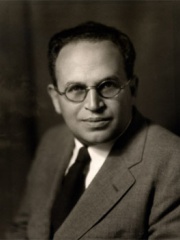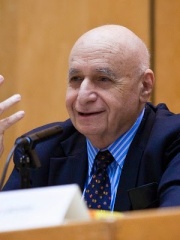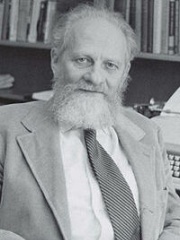


The Most Famous
SOCIOLOGISTS from Austria
This page contains a list of the greatest Austrian Sociologists. The pantheon dataset contains 79 Sociologists, 3 of which were born in Austria. This makes Austria the birth place of the 6th most number of Sociologists behind United Kingdom, and Poland.
Top 3
The following people are considered by Pantheon to be the most legendary Austrian Sociologists of all time. This list of famous Austrian Sociologists is sorted by HPI (Historical Popularity Index), a metric that aggregates information on a biography's online popularity.

1. Paul Lazarsfeld (1901 - 1976)
With an HPI of 67.45, Paul Lazarsfeld is the most famous Austrian Sociologist. His biography has been translated into 27 different languages on wikipedia.
Paul Felix Lazarsfeld (February 13, 1901 – August 30, 1976) was an Austrian-American sociologist and mathematician. The founder of Columbia University's Bureau of Applied Social Research, he exerted influence over the techniques and the organization of social research. "It is not so much that he was an American sociologist," one colleague said of him after his death, "as it was that he determined what American sociology would be." Lazarsfeld said that his goal was "to produce Paul Lazarsfelds". He was a founding figure in 20th-century empirical sociology.

2. Peter L. Berger (1929 - 2017)
With an HPI of 66.69, Peter L. Berger is the 2nd most famous Austrian Sociologist. His biography has been translated into 34 different languages.
Peter Ludwig Berger (17 March 1929 – 27 June 2017) was an Austrian-born American sociologist and Protestant theologian. Berger became known for his work in the sociology of knowledge, the sociology of religion, study of modernization, and contributions to sociological theory. Berger is arguably best known for his book, co-authored with Thomas Luckmann, The Social Construction of Reality: A Treatise in the Sociology of Knowledge (New York, 1966), which is considered one of the most influential texts in the sociology of knowledge and played a central role in the development of social constructionism. In 1998 the International Sociological Association named this book as the fifth most-influential book written in the field of sociology during the 20th century. In addition to this book, some of the other books that Berger has written include: Invitation to Sociology: A Humanistic Perspective (1963); A Rumor of Angels: Modern Society and the Rediscovery of the Supernatural (1969); and The Sacred Canopy: Elements of a Sociological Theory of Religion (1967). Berger spent most of his career teaching at The New School for Social Research, at Rutgers University, and at Boston University. Before retiring, Berger had been at Boston University since 1981 and was the director of the Institute for the Study of Economic Culture.

3. Peter Blau (1918 - 2002)
With an HPI of 54.75, Peter Blau is the 3rd most famous Austrian Sociologist. His biography has been translated into 16 different languages.
Peter Michael Blau (February 7, 1918 – March 12, 2002) was an Austrian and American sociologist and theorist. Born in Vienna, Austria, he immigrated to the United States in 1939. He completed his PhD doctoral thesis with Robert K. Merton at Columbia University in 1952, laying an early theory for the dynamics of bureaucracy. The next year, he was offered a professorship at the University of Chicago, where he taught from 1953 to 1970. He also taught as Pitt Professor at Cambridge University in Great Britain, as a senior fellow at King's College, and as a Distinguished Honorary professor at Tianjin Academy of Social Sciences which he helped to establish. In 1970 he returned to Columbia University, where he was awarded the lifetime position of professor emeritus. From 1988 to 2000 he taught as the Robert Broughton Distinguished Research Professor at University of North Carolina, Chapel Hill in the same department as his wife, Judith Blau, while continuing to commute to New York to meet with graduate students and colleagues. His sociological specialty was in organizational and social structures. He formulated theories relating to many aspects of social phenomena, including upward mobility, occupational opportunity, and heterogeneity. From each of his theories, he deduced an hypothesis which he would test against large scale empirical research. He was one of the first sociological theorists to use high level statistics to develop sociology as a scientific discipline using macro-level empirical data to gird theory. He also produced theories on how population structures can influence human behavior. One of Blau's most important contributions to social theory is his work regarding exchange theory, which explains how small-scale social exchange directly relates to social structures at a societal level. He also was the first to map out the wide variety of social forces, dubbed "Blau space" by Miller McPherson. This idea was one of the first to take individuals and distribute them along a multidimensional space. Blau-space is still used as a guide by sociologists and has been expanded to include areas of sociology never specifically covered by Blau himself. In 1974 Blau served as the 65th president of the American Sociological Association.
People
Pantheon has 3 people classified as Austrian sociologists born between 1901 and 1929. Of these 3, none of them are still alive today. The most famous deceased Austrian sociologists include Paul Lazarsfeld, Peter L. Berger, and Peter Blau.
Deceased Austrian Sociologists
Go to all RankingsPaul Lazarsfeld
1901 - 1976
HPI: 67.45
Peter L. Berger
1929 - 2017
HPI: 66.69
Peter Blau
1918 - 2002
HPI: 54.75
Overlapping Lives
Which Sociologists were alive at the same time? This visualization shows the lifespans of the 3 most globally memorable Sociologists since 1700.

